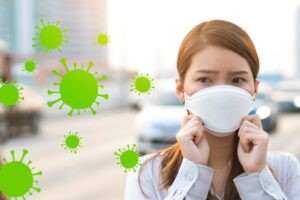Human Papillomavirus (HPV)
Genital Human Papilloma Virus (HPV) infection is the commonest Viral STI in the UK and the majority of sexually active individuals will have HPV infection at some point in their lives.
What is STD?
STD stands for sexually transmitted disease and are also known as STI (sexually transmitted infection). The infections are passed from person to person through sexual contact. If you are worried you may have an STD, are looking for more information, click below
Read moreFind your nearest CityDoc
With over 150 clinics nationwide, there is a CityDoc clinic to suit all of your travel needs
Find a clinicThere are over 100 strains of HPV and around 40 of them affect the genital regions where they can cause either genital warts (low risk strains) or cancerous and precancerous changes (high risk strains). Persisting high risk HPV infection is associated with cervical cancer in 99% of cases. However, high risk HPV infection has also been directly linked to cancers of the anus, mouth and throat, penis, vulva and vagina.
HPV Screens are available for £225 at London flagship clinics only. Results take 5 working days.
-
Discreet & professional service
Real names not needed -
Private clinics with qualified specialists
Walk-in appointments and online bookings are available -
Fast STD screens offered
Early STD screening including HIV from 10 days post contact -
Fast track chlamydia & gonorrhoea tests available
Test results are back within 4-5 hours with optional extras -
Male/Female HPV testing for high-risk subtypes
STD Testing available by a simple swab -
CQC registered
Registered and regulated by the Care Quality Commission
Transmission
HPV infection is very common and is transmitted by sexual activity, including oral, anal and vaginal sex. Most people acquire HPV infection when they start sexual activity. Although, condoms can reduce the risk of transmission, it does not fully protect against it.
Symptoms
Most people who have HPV infection are not aware that they have the infection and the infection is cleared by their own immune system.
In some people, the symptoms can manifest many years after they have acquired the initial infection.
Genital Warts
- These are fleshy lumps or bumps found around the genital regions. They can be small, raised, multiple, very large and shaped like cauliflowers.
- 90% of genital warts are caused by HPV strains 6 and 11.
- Genital warts are generally harmless and will eventually clear without need for treatment. However, they can become very large and are a source of embarrassment.
Cervical Cancer
- Cervical cancer is the most common cancer in women under 35 years of age and is responsible for 2% of cancers in women overall. HPV leads to changes in the cells of the cervix causing cancerous changes to occur over many years.
- About 1 out of every 100 women will have precancerous changes on their cervical smears, requiring further treatment and causing a great deal of anxiety (Cancer Research UK data).
- 70% of cervical cancers are due to HPV types 16 and 18.
Other Cancers
High risk HPV infection has been directly attributable to:
- Anal cancer in around 80% to 90% of cases, mainly due to strains 16 and 18. The risk is increased in men who have sex with men.
- Around 40% of vulval and vaginal cancer.
- Around 30% of cancers of the mouth and throat
- Around 47% of cancers of the penis.
Detection
We can screen for the most important strains of HPV including the high risks strains associated with cancer. This is done via highly accurate DNA testing on a swab and we can discuss with you how to manage positive results, including vaccination, if appropriate.
Participation in Cervical screening programmes is essential as this allows early detection and treatment of precancerous changes to the cervix.
Treatment
There is no treatment for HPV infection itself. In the majority of individuals, the immune system will clear the virus.
Treatment is used to manage the symptoms of HPV infection.
Prevention
As HPV is very common and can be acquired from sexual activity, the best method of prevention is with this highly effective vaccination.
Transmission
HPV infection is very common and is transmitted by sexual activity, including oral, anal and vaginal sex. Most people acquire HPV infection when they start sexual activity. Although, condoms can reduce the risk of transmission, it does not fully protect against it.
Symptoms
Most people who have HPV infection are not aware that they have the infection and the infection is cleared by their own immune system.
In some people, the symptoms can manifest many years after they have acquired the initial infection.
Genital Warts
- These are fleshy lumps or bumps found around the genital regions. They can be small, raised, multiple, very large and shaped like cauliflowers.
- 90% of genital warts are caused by HPV strains 6 and 11.
- Genital warts are generally harmless and will eventually clear without need for treatment. However, they can become very large and are a source of embarrassment.
Cervical Cancer
- Cervical cancer is the most common cancer in women under 35 years of age and is responsible for 2% of cancers in women overall. HPV leads to changes in the cells of the cervix causing cancerous changes to occur over many years.
- About 1 out of every 100 women will have precancerous changes on their cervical smears, requiring further treatment and causing a great deal of anxiety (Cancer Research UK data).
- 70% of cervical cancers are due to HPV types 16 and 18.
Other Cancers
High risk HPV infection has been directly attributable to:
- Anal cancer in around 80% to 90% of cases, mainly due to strains 16 and 18. The risk is increased in men who have sex with men.
- Around 40% of vulval and vaginal cancer.
- Around 30% of cancers of the mouth and throat
- Around 47% of cancers of the penis.
Detection
We can screen for the most important strains of HPV including the high risks strains associated with cancer. This is done via highly accurate DNA testing on a swab and we can discuss with you how to manage positive results, including vaccination, if appropriate.
Participation in Cervical screening programmes is essential as this allows early detection and treatment of precancerous changes to the cervix.
Treatment
There is no treatment for HPV infection itself. In the majority of individuals, the immune system will clear the virus.
Treatment is used to manage the symptoms of HPV infection.
Prevention
As HPV is very common and can be acquired from sexual activity, the best method of prevention is with this highly effective vaccination.
- The HPV vaccine is currently only available privately in the UK.
- The new HPV Vaccine provides immunity to 9 sub-types of HPV including 7 high risk strains. The previous 4 valent version provided coverage against sub-types 6,11, 16 and 18.
- The following 7 High Risk HPV sub-types are contained within the vaccination, HPV 16, 18, 31, 33, 45, 52 and 58, which are found in the majority of HPV associated cancers.
- The vaccine also provides protection against the commonest HPV strains causing warts-strains 6 and 11.
The HPV vaccine is inactivated, which means it cannot cause infection in the vaccinated individual or be transmitted from the vaccinated individual.
Inclusions
The HPV vaccine can be given to both men and women from the age of 9 years, up until age of 45 years.
The vaccine works best when given before you have contracted HPV infection.
Your local CityDoc clinician can discuss whether the vaccine is appropriate for you.
Vaccine Schedule
| Age | Method of Adminstration & Doses | Interval between doses |
|---|---|---|
| Girls and Boys 9-14 years of age | Intramuscular injection to the deltoid.
2 doses |
2nd dose administered 6 to 12 months after 1st dose. |
| Women and Men from 15-45 years of age | Intramuscular injection to the deltoid.
3 doses |
2nd dose administered 2 months after the first and 3rd dose administered 6 months after the 1st dose |
Alternate schedule
For individuals 15-26 years of age:
The 2nd dose can be administered at least 1 month after the 1st dose and the third dose can be given at least 3 months after the 2nd dose.
All three doses must be administered within 1 year of the start date.
- The HPV vaccine is currently only available privately in the UK.
- The new HPV Vaccine provides immunity to 9 sub-types of HPV including 7 high risk strains. The previous 4 valent version provided coverage against sub-types 6,11, 16 and 18.
- The following 7 High Risk HPV sub-types are contained within the vaccination, HPV 16, 18, 31, 33, 45, 52 and 58, which are found in the majority of HPV associated cancers.
- The vaccine also provides protection against the commonest HPV strains causing warts-strains 6 and 11.
The HPV vaccine is inactivated, which means it cannot cause infection in the vaccinated individual or be transmitted from the vaccinated individual.
Inclusions
The HPV vaccine can be given to both men and women from the age of 9 years, up until age of 45 years.
The vaccine works best when given before you have contracted HPV infection.
Your local CityDoc clinician can discuss whether the vaccine is appropriate for you.
Vaccine Schedule
| Age | Method of Adminstration & Doses | Interval between doses |
|---|---|---|
| Girls and Boys 9-14 years of age | Intramuscular injection to the deltoid.
2 doses |
2nd dose administered 6 to 12 months after 1st dose. |
| Women and Men from 15-45 years of age | Intramuscular injection to the deltoid.
3 doses |
2nd dose administered 2 months after the first and 3rd dose administered 6 months after the 1st dose |
Alternate schedule
For individuals 15-26 years of age:
The 2nd dose can be administered at least 1 month after the 1st dose and the third dose can be given at least 3 months after the 2nd dose.
All three doses must be administered within 1 year of the start date.
The HPV vaccine is used for prevention only and cannot treat existing HPV infection.
HPV Vaccination 9 and HPV Vaccine 4 valent are not interchangeable. Therefore, HPV 9 cannot be used to complete courses started with HPV 4 valent and vice versa.
You can receive HPV Vaccine 9 if you have previously and the full vaccination course with HPV 4 valent vaccine. This has not been shown to be harmful.
The HPV vaccine is used for prevention only and cannot treat existing HPV infection.
HPV Vaccination 9 and HPV Vaccine 4 valent are not interchangeable. Therefore, HPV 9 cannot be used to complete courses started with HPV 4 valent and vice versa.
You can receive HPV Vaccine 9 if you have previously and the full vaccination course with HPV 4 valent vaccine. This has not been shown to be harmful.
The following groups cannot receive the vaccine:
- Anyone under 9 years of age.
- Previous history of severe allergic reaction to the 4 valent vaccine or 9.
- Previous history of severe allergic reaction to any of the ingredients of the vaccine, including yeast (see FAQ section).
- Acute illness with fever (greater than 38.5 degrees Celsius).
Pregnancy
Although the vaccine is inactivated and there is data showing that no foetal abnormalities have occurred from using the vaccine, the data is not sufficient to recommend vaccinating with HPV 9 Valent vaccine during pregnancy. It is best that vaccination should be postponed until delivery.
Breast Feeding
There is sufficient evidence from clinical studies showing that the vaccine did not cause any adverse effects in infants who were breast fed during the vaccination course. Thus, the vaccine can be given safely to breast feeding mothers.
Common Side Effects
It has been shown to be well tolerated in clinical studies and post marketing data.
The common side effects observed included:
- headaches
- dizziness
- nausea
- pyrexia
- myalgia
- fatigue
- injection site reactions-redness, swelling and pain, nausea, vomiting
Rare side effects seen were loss of consciousness at the time of the vaccine administration.
Interactions with Other Vaccines
HPV Vaccine-9 can be given at the same time as:
- Diphtheria, tetanus, inactivated polio and pertussis
There is no data on administration with other vaccines. If given at the same time as other vaccines, it should be administered in a separate limb.
There is no interaction between HPV Vaccine 9 and hormonal contraception.
The following groups cannot receive the vaccine:
- Anyone under 9 years of age.
- Previous history of severe allergic reaction to the 4 valent vaccine or 9.
- Previous history of severe allergic reaction to any of the ingredients of the vaccine, including yeast (see FAQ section).
- Acute illness with fever (greater than 38.5 degrees Celsius).
Pregnancy
Although the vaccine is inactivated and there is data showing that no foetal abnormalities have occurred from using the vaccine, the data is not sufficient to recommend vaccinating with HPV 9 Valent vaccine during pregnancy. It is best that vaccination should be postponed until delivery.
Breast Feeding
There is sufficient evidence from clinical studies showing that the vaccine did not cause any adverse effects in infants who were breast fed during the vaccination course. Thus, the vaccine can be given safely to breast feeding mothers.
Common Side Effects
It has been shown to be well tolerated in clinical studies and post marketing data.
The common side effects observed included:
- headaches
- dizziness
- nausea
- pyrexia
- myalgia
- fatigue
- injection site reactions-redness, swelling and pain, nausea, vomiting
Rare side effects seen were loss of consciousness at the time of the vaccine administration.
Interactions with Other Vaccines
HPV Vaccine-9 can be given at the same time as:
- Diphtheria, tetanus, inactivated polio and pertussis
There is no data on administration with other vaccines. If given at the same time as other vaccines, it should be administered in a separate limb.
There is no interaction between HPV Vaccine 9 and hormonal contraception.
1) Can the vaccine be given if I am unwell?
The vaccine can be given in minor illnesses that are not associated with a high fever following assessment by a clinician. However, if you have a fever, it is best to wait until you have recovered to get the vaccine.
2) I have had two doses of the HPV 4 valent vaccine; can I have my third dose with 9 valent?
Courses started with 4 valent vaccine (containing strains 6, 11, 16 and 18) must be completed with this vaccine.
There is no data to suggest that the vaccines are interchangeable.
Similarly if you start a course with the 9 valent, it should be competed with this vaccine.
4) If I have already had the full HPV 4 valent course, can I have the 9 valent course?
If you have had a full course of the 4 valent vaccine (3 doses), then you can choose to have the 9 vaccine. This would provide additional protection against a further 5 high risk HPV strains not covered in the original vaccine. As the vaccine is inactivated, it is not harmful to do so.
5) Should the vaccine be given to Men?
Men should receive the 9 valent vaccine and can be given the vaccine from 9 years of age until their 45th birthday. The vaccine would provide protection against the commonest causes of genital warts (strains 6 and 11), as well as against high risk strains of HPV associated with oral cancer, anal cancer and cancer of the penis.
In Men who have sex with Men, HPV 16 and 18 are found in 80-90% of cases of anal cancer. Therefore, vaccinating with 9 valent could be life saving.
6) Is it still worth having the vaccination if I am already sexually active?
Ideally the vaccination should be administered prior to sexual activity starting as most people acquire HPV infection quite early on in their sexual life. The vaccine will not treat or clear HPV infection that is already present. However, it will prevent the acquisition of HPV strains that you may not already have. As 9 valent provides protection against 9 strains, it is still beneficial to have the vaccination as it would protect you against strains that you may not have acquired.
7) Do I require all three doses of the vaccine?
The vaccine course consists of 2 doses (aged 9-14 years) and 3 doses (aged 15 years onward). Full and sustained protection against the HPV strains contained in the vaccine is not achieved until the third dose is completed. Therefore, it is recommended that the full course is completed.
1) Can the vaccine be given if I am unwell?
The vaccine can be given in minor illnesses that are not associated with a high fever following assessment by a clinician. However, if you have a fever, it is best to wait until you have recovered to get the vaccine.
2) I have had two doses of the HPV 4 valent vaccine; can I have my third dose with 9 valent?
Courses started with 4 valent vaccine (containing strains 6, 11, 16 and 18) must be completed with this vaccine.
There is no data to suggest that the vaccines are interchangeable.
Similarly if you start a course with the 9 valent, it should be competed with this vaccine.
4) If I have already had the full HPV 4 valent course, can I have the 9 valent course?
If you have had a full course of the 4 valent vaccine (3 doses), then you can choose to have the 9 vaccine. This would provide additional protection against a further 5 high risk HPV strains not covered in the original vaccine. As the vaccine is inactivated, it is not harmful to do so.
5) Should the vaccine be given to Men?
Men should receive the 9 valent vaccine and can be given the vaccine from 9 years of age until their 45th birthday. The vaccine would provide protection against the commonest causes of genital warts (strains 6 and 11), as well as against high risk strains of HPV associated with oral cancer, anal cancer and cancer of the penis.
In Men who have sex with Men, HPV 16 and 18 are found in 80-90% of cases of anal cancer. Therefore, vaccinating with 9 valent could be life saving.
6) Is it still worth having the vaccination if I am already sexually active?
Ideally the vaccination should be administered prior to sexual activity starting as most people acquire HPV infection quite early on in their sexual life. The vaccine will not treat or clear HPV infection that is already present. However, it will prevent the acquisition of HPV strains that you may not already have. As 9 valent provides protection against 9 strains, it is still beneficial to have the vaccination as it would protect you against strains that you may not have acquired.
7) Do I require all three doses of the vaccine?
The vaccine course consists of 2 doses (aged 9-14 years) and 3 doses (aged 15 years onward). Full and sustained protection against the HPV strains contained in the vaccine is not achieved until the third dose is completed. Therefore, it is recommended that the full course is completed.
Receiving STD results
During your appointment test results and timings will be discussed. All test results are sent to our London based Harley Street laboratory for analysis and results will be sent directly to you once complete. If your results are positive, our specialist team will be in contact and provide NHS referrals if required. We provide treatment nationwide for Chlamydia and in our London flagship clinics we offer treatment for both Chlamydia and Gonorrhoea.
Sexual health FAQ’s
Are you unsure on the difference between an STD and STI? What happens if I have a positive result? If you are looking for answers to these and other sexual health questions, we have put together a list of FAQ’s for you.
Sexual health enquiries
If you need further help regarding any sexual health matters, simply contact us below



